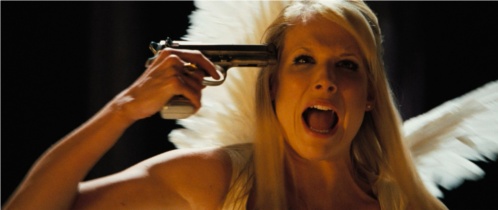>
Ah the holidays. I love the holidays. Lots of good food, good smells, everyone’s in a better mood, pretty shiny decorations go up, and things begin to wind down for the winter here in academia-land.
There’s only one problem. Holidays inevitably mean family, and big parties, and otherwise excuses to see people who you don’t generally talk to the rest of the year. Normally, this is a welcome (if drama-filled) change from the humdrum. However. This year, things are… slightly different. I’m a little bit stressed out due to everything going on in my life, and I’d rather not have to explain the reasons behind this to every single person who doesn’t usually talk to me more than once every few months. It’s not that I don’t love you, it’s not that you’re not important to me, it’s just that I’d rather not think about the progression of my life right now. It’s exciting, yes, but also terrifying and having to dredge that up in front of an audience ad noseum brings me back to my conservatory days. I’m not afraid to cry hysterically in a roomful of strangers, they beat that out of me at Shakespeare & Company, I’m just trying to slip into a happy numbness for a few months before I really start worrying about my life.
So, loved ones, in lieu of explaining all of this over Christmas Ham and Chanukah Latkes (yes, we do both, don’t ask), I’m writing a list of Frequently Asked Questions right here on the blog that you can read, enjoy, then (if I’ve failed to cover anything to your satisfaction), go ahead and ask me specific things. That way we can all have a happier holiday season. You don’t have to awkwardly stand around while I’m falling to bits about potential near-future crises due to “poor life decisions”, and I don’t have to fall to bits about it until rejection/acceptance letters come sometime this Spring.
Thank you, in advance, for your understanding.
Q: So, what are you up to these days, Danielle?
A: Oh man, I’m super busy. Work at the studio isn’t slowing down, we’re coming up to grading the last set of papers, my own finals are due, and I have PhD aps that I’m trying desperately to get off my desk. Also starting to really worry about the Common Reading Exam in March, but that’s only a small percolation because everything else on this list comes before that.
Q: Oh? Where are you applying?
A: Brown, Tufts, and Columbia.
Q: Only three programs? Wow. What are you applying for?
A: Yea, only three. There’s only three in the Northeast that really work for me, four in the country if I want to apply to Stanford but I don’t really want to move out to California. I’m applying for a PhD in Drama (some schools call it “Theatre Studies”), but it basically means the intersection between scholarship and theatre, which is what I study anyway. I mean, if I don’t get in this round, I could try to find an open-minded English department, but I’d rather be amongst theatre people, you know? The English-iesh don’t really know what to do with me…
Q: What do you plan on doing with that?
A: Well, I want to open my own theatre someday and I figure that people will be more willing to give me money to do that if I have letters after my name. I have some pretty revolutionary ideas about American Shakespeare performance; I want to start a real classical repertory company and link it to a University’s theatre department. That way, young actors will learn the old-fashioned way; they’ll learn everything about the stage, all facets, and they’ll get a chance to work with more experienced actors which I really think is golden for them. It’s important to understand the theatre in all its aspects, and I really want to create a generation of “Renaissance Actors”.
I also envision it as a place where scholarship and practicum meet; a sort of Shakespeare Mecca. We kind of have that here in the states down at the Folger in Washington, but for the most part Shakespeare scholars and Shakespeare actors/directors don’t really talk. I think there’s a lot to be learned from both sides, and I would like to see it performed that way. I want to have an open dialogue across this scholarship/practicum rift, see if we can’t heal it up some. I’m wondering what kind of theatre that will make…
Also, I firmly believe in experimental Shakespeare. And I don’t mean like “Hamlet on the moon”. I’m thinking of something pure and classical, yet hip and contemporary. I’m still working on how all these ideas mesh together though… but I’ll have some time. It’ll take me six years for the PhD anyway.
Oh, and I want to be a professor. Because really, it’s the coolest job title ever. And can you think of anything more fulfilling? I get to instill a new generation with my ideas about literature and theatre? Count me IN!
Q: Oh… uhm… you know that’s not really very practical. Your back-up idea is being a professor? Do you know what the unemployment rate…
A: For newly-minted PhDs? Yes, yes I do. But I can’t shoot for the moon just because I’m frightened of where I’ll land. It would be stupid to compromise out of fear. I know I love theatre, I know I love academia, I know a lot of things that I hate doing. I’m not going back to working in a cube just because someone tells me “no”.
Q: Well… what if you don’t get in?
A: I spend a year conferencing, trying to get published, up my hours at the studio, and try to find a couple sections of something to teach somewhere. Make my application better, then try again next year. I mean, really, these programs take two to four people a year. When you’re talking about the top ten applicants to Columbia or Brown, you’re talking about people who all have 4.0s, who all have perfect GREs, who are all amazing writers. They don’t reject you because you suck, they reject you because you’re not what they’re looking for that year. I could get ousted from being offered a spot just because they have another Shakespearean currently working through the program, or someone on the selection committee really wants to work with another applicant. I mean, for all intents and purposes, they may as well take the top ten applications, pin them to a wall, have a couple beers, and throw darts to see who gets in. I understand that, and I’m prepared to accept whatever comes. But if you don’t try, you’ll never know, right?
Q: I guess that makes sense… but won’t you have a ton of debt when this is all through?
A: Not any more than I have now. These programs are all fully funded. They would pay me to read books for six years!
Q: Hey, didn’t you want to go study in England?
A: That’s the best part! You get two fellowship years for these things. You are required to take one your first year just to acclimate. Usually, people take the second in their sixth year to write their dissertation, but there’s nothing saying you couldn’t take it in your fourth or fifth. I could take a fellowship year, then go research in Stratford or at the Bodleian if I needed to… all on the school’s buck. How awesome is that?
Q: Pretty neat! When are your due dates?
A: December 15th, January 3rd and January 15th, but I hope to have them all in by January 1st. Once my finals are in, I can really concentrate on getting the last two banged out.
Q: And when do you find out?
A: They aim to tell you the second week of February, but it’s not like undergrad when there’s a certain day that you get the letter in the mail. They do expect to hear back from you about your decision by April, so sometime before then.
Q: So what are we drinking to celebrate/commiserate?
A: B. Nektar Vanilla Cinnamon Mead. And thanks. I have a feeling that I will need all the calming vibes I can get for a few months…







